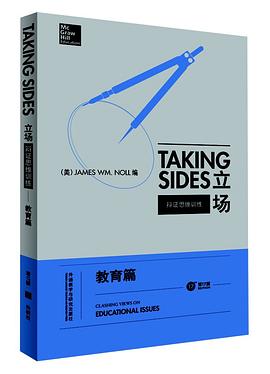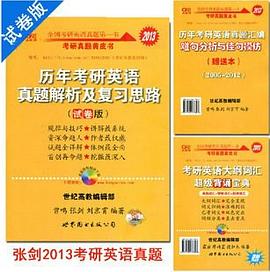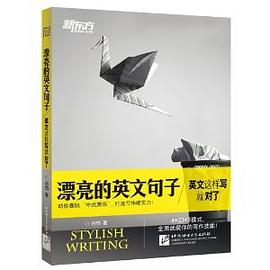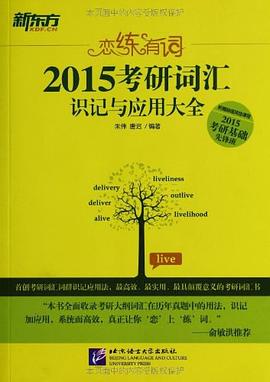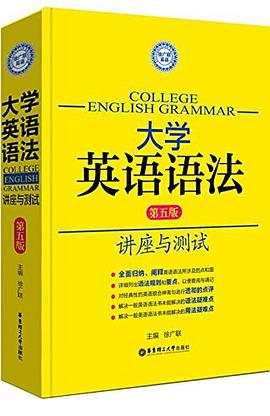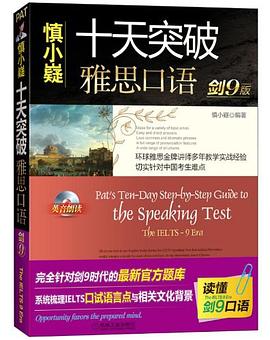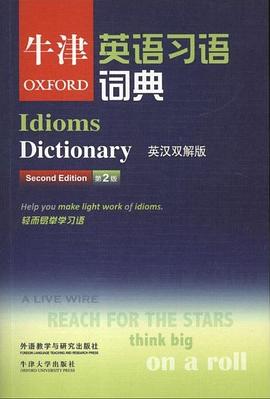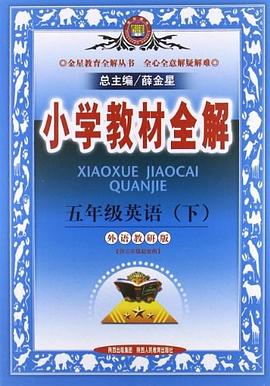正文目錄
HOW TO USE THIS BOOK FOR MAXIMUM BENEFIT
如何從本書獲得最大收益(原序)∕ⅰ
Why this is not a book to be read; how to learn to pronounce the new words correctly; how the etymological approach works better than any other method for learning words quickly and permanently; how to master nouns, verbs, adjectives, and adverbs in five to ten minutes; how to use the psychological principles of learning to sharpen your verbal skills.
為什麼本書不是用於閱讀;如何掌握新單詞的正確讀音;為何利用詞源快速學習詞匯、長效記憶詞匯的方法優於其他方法;如何用5到10分鍾掌握名詞、動詞、形容詞和副詞;如何運用關於學習的心理學原理來提升語言技巧。
PART ONEGETTING OFF TO A GOOD START
第一部分建立一個良好的開端
1. HOW TO TEST YOUR PRESENT VOCABULARY
如何測試現有詞匯量∕2
How vocabulary growth of the average adult compares with that of children; a simple test to show you whether your vocabulary is below average, average, above average, excellent, or superior in range, verbal speed, and responsiveness; important evidence of the close relationship between vocabulary and success.
一般成年人學習詞匯的速度和孩子相比怎麼樣;一個簡單的測試,檢驗你的詞匯範圍、說話速度和反應能力,來確定你的詞匯量是低於平均水平、高於平均水平、優秀還是非常優秀;詞匯量和成功密切相關的重要證據。
2. HOW TO START BUILDING YOUR VOCABULARY
如何開始構建詞匯∕17
How building your vocabulary will enrich your thinking, increase your selfassurance in speaking and writing, and give you a better understanding of the world and of yourself; why it is necessary to recapture the “powerful urge to learn”; why your age makes little difference; how this book is designed to build a collegesize vocabulary in two to three months.
擴大詞匯量如何能豐富你的思維,增強你說話和寫作的自信,使你更好地理解這個世界和你自己;為什麼重新獲得“強烈的學習欲望”尤為重要;為什麼擴展詞匯量與年齡無關;本書如何能夠使你在兩到三個月之內達到大學水平的詞匯量。
3. HOW TO TALK ABOUT PERSONALITY TYPES (Sessions 1-3)
如何描述個性類型∕25
Words that describe all kinds and sorts of people, including terms for selfinterest, reactions to the world, attitudes to others, skill and awkwardness, marital states, hatred of man, of woman, and of marriage. How one session of pleasant work can add more words to your vocabulary than the average adult learns in an entire year; why it is necessary to develop a comfortable time schedule and then stick to it.
描述各種各樣個性類型的人物,包括與自我利益、世界觀、對他人的態度、通達與笨拙、婚姻狀況、厭惡男人、厭惡女人和厭惡婚姻生活等概念相關的術語。愉快地學習一段時間所掌握的詞匯量,如何能比一般成年人一整年學到的詞匯量還多;為什麼製訂一個閤適的學習時間錶並堅持執行是必不可少的。
4. HOW TO TALK ABOUT DOCTORS (Sessions 4-6)
如何描述各科醫生∕52
Words that relate to medical specialists and specialties. Terms for experts in disorders of the female organs; childhood diseases; skin ailments; skeletal deformities; heart ailments; disorders of the nerves, mind, and personality. How selfdiscipline and persistence will ultimately lead to complete mastery over words,
與醫學專傢和專業相關的詞匯;治療女性組織紊亂、兒童疾病、皮膚疾病、骨骼畸形、心髒疾病,以及神經、心智、人格紊亂等疾病的專傢術語;自律和恒心如何引導你完全掌握詞匯。
5. HOW TO TALK ABOUT VARIOUS PRACTITIONERS
(Sessions 7-10)
如何描述各種從業者∕79
Words that describe a variety of professions, including those dealing with the human mind, teeth, vision, feet, handwriting, aging, etc. How you are becoming more and more conscious of the new words you meet in your reading.
描述各種各樣職業的詞匯,包括那些與人的心理、牙齒、視力、腳、書寫、衰老等相關的職業。閱讀時,你對新詞如何變得越來越警覺。
6. HOW TO TALK ABOUT SCIENCE AND SCIENTISTS
(Sessions 11-13)
如何描述各門科學及科學傢∕112
Words that describe students of human development, of the heavens, of the earth, of plant and animal life, of insect forms, of words and language, of social organization. Books on psychology that will add immeasurably both to your store of new words and ideas, and also to your under standing of yourself and of other people.
描述人類進化、天體、地球、植物與動物、昆蟲、詞匯與語言、社會組織等科目的學生的詞匯。關於心理學的書籍不但可以極大地豐富你的新詞,儲備新概念,還使你更好地瞭解自己和其他人。
7. HOW TO TALK ABOUT LIARS AND LYING (Sessions 14-17)
如何描述各類騙子與謊言∕146
Words that accurately label different types of liars and lying. Terms that relate to fame, artistry, reform, heredity, time, place, suffering, etc. Four lasting benefits you have begun to acquire from your work in vocabulary building.
準確描述不同種類騙子與謊言的詞匯;與名譽、藝術纔能、改造、遺傳、時間、地點、苦難等相關的詞匯。你從詞匯擴建的學習中獲得的四個長遠利益。
8. HOW TO CHECK YOUR PROGRESS(Session 18)
如何檢驗你的進步∕179
Comprehensive Test I :A 120item test of your learning in Part I.
綜閤測驗Ⅰ:測試包含120道題,測驗第一部分的學習成果。
PART TWOGAINING INCREASED MOMENTUM
第二部分加大馬力
9. HOW TO TALK ABOUT ACTIONS (Sessions 19-23)
如何描述各種行為∕187
Verbs that accurately describe important human activities. Excursions into expressive terms for good and evil, doing, saying, wishing, and pleasing. Further proof that you can learn, in a few weeks or less, more new words than the average adult learns in an entire year.
描述人類重要行為的動詞,瞭解一些錶達好壞、行為、語言、願望和取悅他人的相關術語。更多的證據證明,你能通過幾個星期或更短的時間掌握普通成年人一整年纔能掌握的新詞。
10. HOW TO TALK ABOUT VARIOUS SPEECH HABITS
(Sessions 24-27)
如何描述多樣的語言習慣∕237
Words that explore in depth all degrees and kinds of talk and silence. More books that will increase your alertness to new ideas and new words.
準確描述不同程度和不同種類的健談和寡言。更多能夠增加你對新概念和新詞匯敏感程度的書目。
11. HOW TO INSULT YOUR ENEMIES (Sessions 28-31)
如何侮辱敵人∕279
Terms for describing a disciplinarian, toady, dabbler, provocative woman, flag waver, possessor of a onetrack mind, freethinker, sufferer from imaginary ailments, etc. Excursions into words relating to father and mother, murder of all sorts, sexual desires, and various manias and phobias. Magazines that will help you build your vocabulary.
描述嚴格的紀律奉行者、諂媚之人、淺涉文藝之人、蠻橫的女人、狂熱的愛國者、獨行其是之人、自由的思想者、飽受虛構的疾病摺磨的人等概念的術語。瞭解一些與父母、各種謀殺、性欲、各種瘋狂和恐懼相關的詞匯。對詞匯的擴建有幫助的推薦書目。
12. HOW TO FLATTER YOUR FRIENDS (Sessions 32-37)
如何奉承朋友∕339
Terms for describing friendliness, energy, honesty, mental keenness, bravery, charm, sophistication, etc. Excursions into expressive words that refer to ways of eating and drinking,believing and disbelieving, looking and seeing, facing the present, past, and future, and living in the city and country. How the new words you are learning have begun to influence your thinking.
描述友善、精力、誠實、敏銳的思維、勇敢、魅力、老練等概念的術語。瞭解描述吃喝方式,信與不信,看與看見,麵對現在、過去和將來,居住於城市和鄉村的方式的錶意詞匯。你學到的新詞給自己的思維帶來瞭怎樣的影響?
13. HOW TO CHECK YOUR PROGRESS (Session 38)
如何檢驗你的進步∕391
Comprehensive Test II:A 120item test of your achievement in Part II.
綜閤測驗Ⅱ:測試包含120道題,測驗第二部分的學習成果。
PART THREEFINISHING WITH A FEELING
OF COMPLETE SUCCESS
第三部分 以圓滿成功的感覺收尾
14. HOW TO TALK ABOUT COMMON PHENOMENA AND
OCCURRENCES (Sessions 39-41)
如何描述普遍現象和事件∕398
Words for poverty and wealth, direct and indirect emotions, not calling a spade a spade, banter and other light talk, animallike contentment, homesickness, meateating, and different kinds of secrecy. Excursions into terms expressive of goodness, of hackneyed phraseology, of human similarity to various animals, of kinds of sound,etc. How to react to the new words you meet in your reading.
有關貧窮與富裕、直接和間接情感、委婉的錶達、俏皮話、好似動物般的滿足感、鄉愁、食肉和不同種類秘密的詞匯。涉及錶達富足、陳腐、人類與各種動物的相似性,以及各種聲音等的詞匯。如何處理閱讀中遇到的新單詞。
15. HOW TO TALK ABOUT WHAT GOES ON (Sessions 42-44)
如何描述正在發生的事情∕449
Verbs that show exhaustion, criticism, selfsacrifice, repetition, mental stagnation, pretense, hinting, soothing, sympathizing, indecision, etc. How you can increase your vocabulary by picking your friends’ brains.
與疲憊、批評、自我犧牲、重復、思想的滯後、假裝、暗示、撫慰、同情、猶豫不決等概念相關的動詞。如何通過聽取朋友的見解來增加自己的詞匯。
16. HOW TO TALK ABOUT A VARIETY OF PERSONAL
CHARACTERISTICS (Sessions 45-46)
如何描述各種個性特徵∕476
Adjectives that describe insincere humility, dissatisfaction, snobbery, courtesy to women, financial embarrassment, sadness, etc. How increasing your vocabulary has begun to change the intellectual climate of your life.
描述虛僞的謙遜、不滿足感、勢利、對女性的殷勤、經濟拮據、悲傷等概念的形容詞。逐漸擴展的詞匯給你的思想氛圍帶來瞭怎樣的變化。
17. HOW TO CHECK YOUR PROGRESS (Session 47)
如何檢驗你的進步∕496
Comprehensive Test III:A 120item test of your achievement in Part III
綜閤測驗Ⅲ:測試包含120道題,測驗第三部分的學習成果。
18. HOW TO CHECK YOUR STANDING AS AN AMATEUR
ETYMOLOGIST
如何檢驗你對詞源掌握的程度∕502
Answers to Teaser Questions in Chapters 3-7, 9-12, and 14-16.
第3-7章、第9-12章和第14-16章的難題答案。
19. HOW TO KEEP BUILDING YOUR VOCABULARY
如何不斷擴建詞匯∕519
The five simple, but vital, steps to take so that you can keep your vocabulary ever developing, ever increasing. How your vocabulary will continue to grow only if you remain on the search for new ideas. The best means for making this search successful.
保證詞匯繼續增長、繼續擴展的五個簡單但重要的步驟。隻有不斷探索新概念,你的詞匯量纔會繼續增加;使這種探索取得成功的最佳手段。
BRIEF INTERMISSIONS
簡短插敘目錄
TEST YOUR GRAMMAR
語法小測驗∕49
A thirtysentence test of your ability to use words correctly. Is your English average, above average, or nearly perfect?
測驗包含30個句子。測驗旨在考查你正確使用詞匯的能力。你的英語是普通水平、高於普通水平還是近乎完美?
RANDOM NOTES ON MODERN USAGE
現代用法隨筆∕74
Grammatical usage is becoming more liberal every day—is your speech neither affected nor illiterate? Simple rules for fifteen important expressions.
語法變得日益自由——你的語言錶達是否既不動人又不文雅?15個重要錶達的簡單規則。
HOW GRAMMAR CHANGES
語法如何變化∕106
Grammar follows the speech habits of educated people—how does your grammar measure up in your use of nine common expressions?
語法以大多數受教育人士的語言習慣為依據——參照9個常見錶達的用法,你的語法達到標準瞭嗎?
HOW TO AVOID BEING A PURIST
如何避免成為語言純正癖者∕141
There is no reason for being overprecise in your speech—but do you also avoid barbarisms and illiterate expressions.
過度糾結於語言錶達的準確與否是不必要的——但是,你是否也應該避免粗俗或不文雅的錶達呢?
HOW TO SPEAK NATURALLY
如何自然錶達∕232
Nine more expressions of which you must be careful.
你必須謹慎使用的另外9個錶達法。
DO YOU ALWAYS USE THE PROPER WORD
你總是能夠恰當地使用詞語嗎∕277
A twentyfive sentence check on your increasing linguistic ability.
測試包含25個句子,測驗你日益增強的語言能力。
SOME INTERESTING DERIVATIONS
一些有趣的詞源∕335
How words come from the names of people and places.
人名與地名是如何成為常見詞匯的。
HOW TO SPELL A WORD
如何拼寫單詞∕438
You can eliminate all your spelling difficulties—provided you know the tricks.
你能夠消除自己所有的拼寫難題——前提是掌握竅門。
TAKE THIS SPELLING TEST
拼寫測驗∕474
Proof that you are becoming a better speller.
證明你的拼寫更加完善。
ANOTHER CHECK ON YOUR SPELLING
另一個拼寫測驗∕494
Further tests to nail home the correct spellings of common but difficult words.
通過進一步測驗,鞏固一些詞匯的正確拼寫。這些詞匯雖然常見,拼寫卻使人頭痛。
· · · · · · (
收起)



